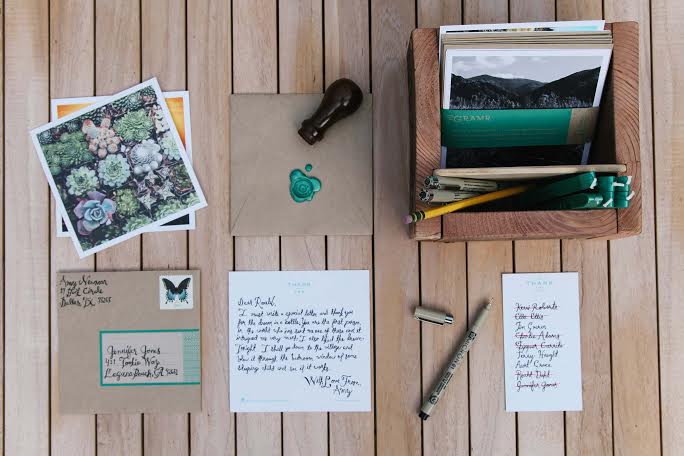
As an expat, the proliferation of mobile devices is one of the best things that has happened in the seven years since I moved to Asia. I can send silly photos or pour my heart out to friends all around the world — New Zealand, the U.S., Australia, England, Lithuania, Sweden — anytime I want. But those moments of connection often feel fleeting and the more time I spend abroad, the more I worry that I’m not doing enough to keep my relationships from gradually evaporating. That’s one of the reasons I was excited to learn about Gramr, a startup that wants to use the subscription-box business model to turn gratitude into a habit.
Currently on Kickstarter, Gramr has already raised more than twice its initial goal of $15,000, which shows that there are plenty of people who are also looking for deeper ways to connect with important people beyond a text or email.
The concept is simple: every month Gramr sends you a box with cards and envelopes, as well as optional items like postage stamps, custom wax seals, and sealing wax. All you need to do is write the cards and then drop them into a mailbox.

Co-founders Matt Richardson and Brett McCollum wanted to make sure their products would appeal to stationery junkies, so they worked with Chen Design Associates and used premium materials, like cardstock by Neenah Paper (a popular brand among designers, letterpress printers, and paper crafters), and kraft envelopes from French Paper Co. with lined interiors and foiled accents. Cards are 5-by-5 inches, big enough for relatively length messages, but not so large that they put off people who are not used to handwriting notes.
But Gramr aspires to be more than just a greeting card subscription service. Richardson says he wants the startup to “turn the world into a more grateful place.” For those of you who think this sounds outlandishly cheesy, several research studies have found that showing gratitude regularly can increase your happiness and even have physical health benefits like stronger immune systems and lower blood pressure.
Of course, being the recipient of a handwritten note telling you how awesome you are also feels great. Richardson says he and McCollum wanted to launch a greeting card startup, but couldn’t find a business model they connected with until they started thinking about thankfulness. After reading about the benefits of gratitude, Richardson started sending thank you cards to his friends and family. Then he began writing to people he had lost touch with, like former teachers and mentors.

“Their minds are blown because it’s such a radical thing to experience nowadays,” Richardson says. “I’ve gotten calls from people and they’ll be crying. It’s not always an extreme reaction like that, but at least you know you are moving somebody.”
Each month’s box of cards feature images from photographers with large followings on Instagram or VSCO; Richardson says Gramr wants to make cards that people will display instead of filing away. Gramr’s founders hope their subscribers become part of a community and share tips about how to show gratitude in different situations.
Eventually Gramr plans to expand by adding a B2C service for small companies that want to find new ways to connect with customers. Richardson says he thinks handwritten cards are a much better alternative to promotional e-mail blasts or cheap calendars.
“In the world of marketing, you can’t tell people what to think about a product,” he says. “But you can stand apart by making a sincere gesture.”
Read more : Gramr Wants To Help You Turn Expressing Gratitude Into A Habit

0 Responses
Stay in touch with the conversation, subscribe to the RSS feed for comments on this post.